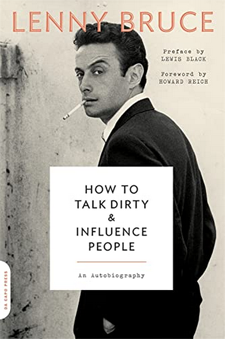“All great truths begin as blasphemies.”
–George Bernard Shaw
“Powerful people and popular ideas don’t need First Amendment protections; marginalized people and unpopular ideas do.”
–Nadine Strossen, former ACLU president (1991-2008), Senior Fellow, FIRE
During a time where free speech assaults are now taking place on behalf of both the political right and the left (nothing new to see here, folks), it’s interesting to take a look at this classic autobiography from Lenny Bruce. How to Talk Dirty & Influence People is a take on Dale Carnegie’s How to Win Friends & Influence People, and describes the life of Bruce from his childhood up to the time of his premature death at the age of 40. Born in Mineola, NY, Bruce’s parents divorced when he was 10, and during his childhood he spent time living and working on a farm in Wantagh, NY. Bruce joined the Navy at the age of 16 in 1942, serving in WW2. After appearing in drag for a comedy bit, he convinced his CO that he had homosexual urges and received an honorable discharge. The Max Klinger character from M*A*S*H was based on Bruce. After discharge, he went on to develop his stream of consciousness comedy routines and worked as an MC in Jazz clubs. His routines often focused on themes of race relations, organized religion, and criticism of “the establishment”. Certainly, in today’s world, most of his bits would offend damn near everyone, and there likely would be numerous calls to ban or censor him. This in fact was the case with Brandeis University, which now hosts Bruce’s audio files. Brandeis University is named after former Supreme Court Justice Louis Brandeis, champion of free speech and advocate of counter speech:
“If there be time to expose through discussion, the falsehoods and fallacies, to avert the evil by the processes of education, the remedy to be applied is more speech, not enforced silence.”
This notion seems to be forgotten or kicked to the curb in today’s world. After the audio files came in the possession of Brandeis University, Michael Weller, former graduate of Brandeis and playwright, wrote a play based on Bruce’s work, examining the ideas of free speech. Outrage over the content of the play quickly ensued, and the University promptly cancelled it. Oh, the irony. College campuses are now replete with multiple trigger warnings on practically everything, self-censorship among students for fear of repercussions, and frequent disruptions and outbursts directed at speakers who are disagreeable. They are no longer the bastions of free speech, thought, healthy debate, and exchange of ideas they once were. As Penn Jillette says:
“If college is so comfortable and safe — I’m glad I’m not there. Who wants comfortable? Who wants safe? This old piece of carny trash still wants to be pushed and challenged, and I’ve proved I can do that without college. And it’s a lot cheaper than Brandeis.”
How to Talk Dirty and Influence People also describes Bruce’s marriage to burlesque dancer Honey Harlow, and the two obscenity trials that ultimately broke him (physically, emotionally, and financially). Plagued by legal troubles relating to his drug use and financial scams (he dressed as a priest and solicited donations for a “leper colony in British Guyana”), he was ultimately charged with obscenity in (of all places) San Francisco (acquitted), Chicago (convicted but later overturned by the Illinois Supreme Court), and New York (convicted but later overturned by the New York Court of Appeals). Bruce died while the NY appeal was in process.
The book is an interesting incursion into Bruce’s life, and while the title mentions talking dirty, there’s not much of it in this book. A few tidbits of his routines and trials, but it’s mostly about his life and not his comedy acts.
Bruce, Lenny. How to Talk Dirty and Influence People: An Autobiography. Da Capo Press, Reprint edition. 2016.


